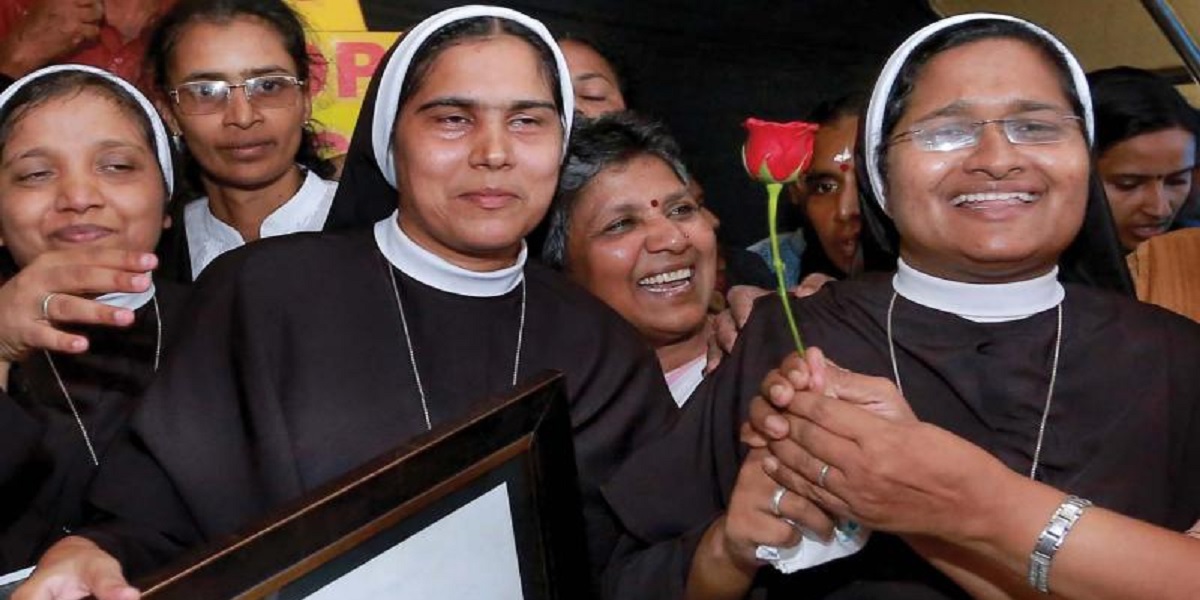Published May 28, 2025 | 9:00 AM ⚊ Updated Jun 11, 2025 | 9:15 AM

Sister Anupama, the nun who led the protest against Bishop Franco, has renounced her nunhood.
Synopsis: The six nuns from the Syro-Malabar Catholic Church who publicly stood against former Bishop Franco , acquitted in a rape case, have found themselves ostracised, stripped of Church support, and increasingly pressured to leave convent life, with half of them having already done so. After his acquittal, Bishop Mulakkal continues to remain active within the Church, while the nuns have been pushed – some into poverty, others into silence or secular employment.
“Learn to do good; seek justice, correct oppression,” says a verse from the Bible.
In 2018, six nuns from the Jalandhar Diocese of the powerful Syro-Malabar Catholic Church did just that.
They bravely stood up against Bishop Franco Mulakkal, then the Bishop Emeritus of the Diocese, who was accused of repeatedly raping one of their own. While a lower court acquitted him, an appeal challenging his acquittal has been admitted in the Kerala High Court.
The nuns chose to speak their truth. They stood up against injustice. They stood by their fellow sister. And for that, they find themselves cast out.
They are no longer called the brides of Christ. Once devoted to prayer and service in quiet convents, they now live amid the noise and rush of city life, far from the sacred spaces they once called home.
Abandoned by the Church, they now struggle to survive – some taking small jobs, others relying on family support.
Sister Anupama Kelamangalathuveliyil, one of the six, has officially left the convent.
She holds a postgraduate degree in Social Work and was formerly associated with the convent in Kuravilangad, under the jurisdiction of the Jalandhar Diocese, Punjab.
About six weeks ago, she moved back to her family home in Alappuzha. Currently employed as a data entry operator at an IT company based in Infopark, Pallipuram, she has remained silent on her decision to step away from monastic life.
This is not just Sister Anupama’s story.
It is the story of institutional silence, marginalisation, and forcible exile into obscurity – of the survivor who originally accused Bishop Mulakkal and the four other nuns who stood by her: Sister Neena Rose, Sister Josephine, Sister Alphy, Sister Aansita, alongside Sister Anupama.
The ordeal began in June 2018, when the survivor came forward with accusations that Bishop Franco had sexually abused her on 13 occasions between 2014 and 2016.
Despite lodging a formal complaint, no immediate action was taken, prompting Sister Anupama and a group of fellow nuns to stage a public protest.
Although Bishop Franco was eventually arrested, he was granted bail and later acquitted in January 2022.
Pope Francis accepted Bishop Franco Mulakkal’s resignation in June 2023, following his acquittal in the rape case.
However, despite stepping down, Mulakkal remains active in Church-related activities outside his former diocese, including conducting private prayers and living what appears to be a normal life.
Following the verdict, the six nuns remained in the same convent and vowed to continue their advocacy.
However, over the past three years, three – Sister Neena Rose, Sister Josephine, and Sister Anupama – have renounced their nunhood and left the congregation.
Sister Neena, one of the three who left, also suffered a serious injury in a road accident and underwent long-term treatment.
Financial strain and internal conflicts eventually deepened divisions among the nuns, resulting in mental stress and, ultimately, the departure of three of them.
Sources say the Jalandhar Diocese and convent authorities were informed of their decision to leave.
According to the ‘Save Our Sisters’ group, diocese officials visited the convent once for a discussion. The remaining nuns have declined to comment on the situation.
After Sister Anupama and two fellow nuns left the Missionaries of Jesus convent in Kuravilangad, only three remain: Sister Alphy, Sister Aansita, and the survivor.

Sister Anupama and her fellow sisters led the protest. The survivor in the rape case has not come before the media since that time.
They now live in near isolation, struggling mentally and with minimal resources, sometimes even lacking food, a source from the convent told South First.
Though the police protection granted by the court at the start of the case continues, they are practically cut off from the outside world.
Until two years ago, the convent ran a hostel and did small-scale farming, with all income handed over to the Jalandhar Diocese as per agreement.
The diocese, in turn, provided funds for daily expenses. After the hostel shut down, the sisters managed with poultry and limited farming on the convent land.
When South First contacted Sister Lucy Kalapura, a key figure in the protest against Bishop Franco Mulakkal, she detailed years of isolation and cruelty faced by the nuns in Kuravilangad who dared to speak out.
According to Sister Lucy, the hardships inside the convent were severe from the very beginning of the protests.
The six nuns were removed from their regular duties and excluded from all community activities.
They were completely isolated, even forced to eat in separate dining rooms.
The convent authorities, along with subordinate sisters, stopped speaking to them entirely. The atmosphere turned hostile and hateful.
Within months, the sisters in power vacated the convent – a property of the Jalandhar diocese – taking with them pets and even the name board.
Elderly residents were relocated, and food and medical support were cut off. Over the next two years, the six nuns received repeated instructions to vacate the premises.
The diocesan administrator made symbolic repairs, claiming a portion might be allotted to them – a promise that never materialised.
Eventually, they were pressured again to leave, with vague promises of help “if they vacated.”
In a desperate bid to survive, they began poultry farming and stitching clothes.
But this was weaponised against them, and they were accused of “running a business.”
Despite serving in the Jalandhar congregation for years, they were thrown out with no support. The administrator even declared Franco “not guilty.”
The Save Our Sisters Action Council remains the only organisation that has consistently supported the nuns from the very beginning.
Speaking to South First, the council’s joint convener Shyju Antony said the nuns did not leave their religious congregation by choice but were forced out due to the Church and diocesan authorities’ lack of support.
“Sister Josephine now lives a very private life somewhere in Bengaluru. Anupama has also chosen a life away from public attention,” he said.
“During the time of the accident, Neena Rose went through immense struggle. We supported her both financially and emotionally.”
He continued: “This is, in fact, a silent revolution. In Europe, it’s rare to see nuns under the age of 60, and their numbers are rapidly declining. The same trend is now visible in Kerala.”
He highlighted the precarious situation of the nuns, stating that their safety and security largely depend on whether their parents are alive.
“Once they return to their siblings, it’s rare for them to be accepted or provided with a place to stay,” he added.
“Look at how the bishop lives and then look at the sisters, how much they continue to struggle.”
Antony also pointed out that the issue isn’t limited to nuns.
“Priests like Father Aji Puthiyaparambil are also facing severe hardship for speaking up against the system,” he said.
Syro-Malabar Catholic priest Father Aji stepped down from active ministry in May 2023, citing a “general decay in the Church.”
In response, the Thamarassery diocese imposed disciplinary actions against him, including a ban on publicly celebrating the Eucharist and restrictions on engaging with the media.
“Father Aji has managed to survive thanks to the support of fellow priests. But for many others, life is not so kind. The Church remains indifferent even to suicides among its own priests. It’s pathetic,” Antony said.
(Edited by Dese Gowda)

